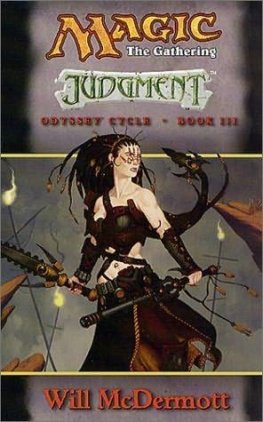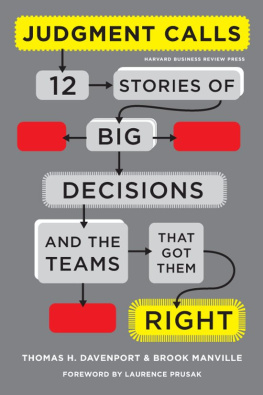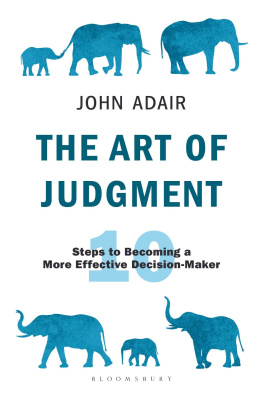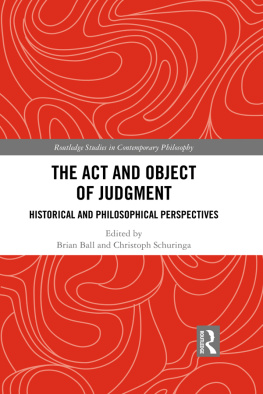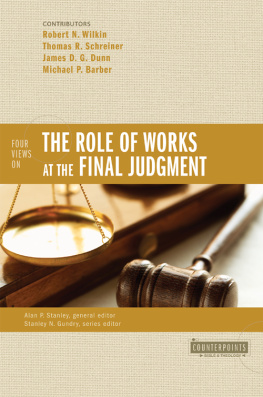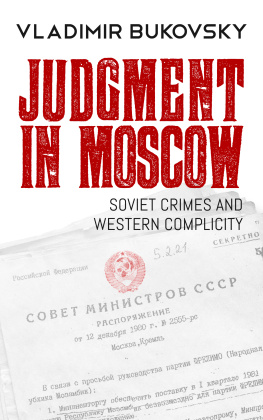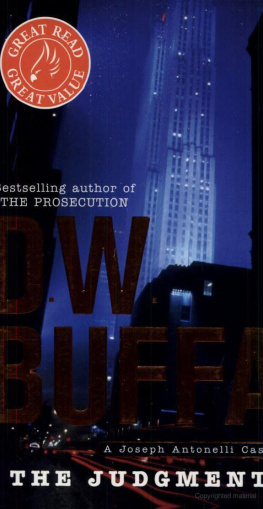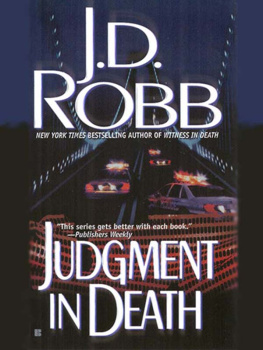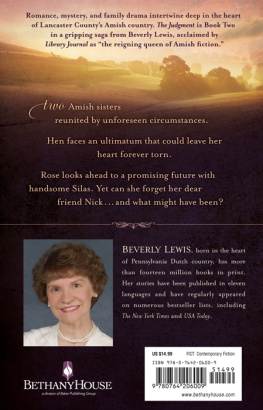Judgment Calls
Polemics Series
Series Editors
Michael Calvin McGee and Barbara Biesecker, University of Iowa
John M. Sloop, Vanderbilt University
Judgment Calls: Rhetoric, Politics, and Indeterminacy,
edited by John M. Sloop and James P. McDaniel
The Rise of Rhetoric and Its Intersections with
Contemporary Critical Thought,
OmarSwartz
Without Apology: Andrea Dworkins Art and Politics,
Cindy Jenefsky
Polemics Series
First published 1998 by Westview Press
Published 2018 by Routledge
711 Third Avenue, New York, NY 10017, USA
2 Park Square, Milton Park, Abingdon, Oxon OX14 4RN
Routledge is an imprint of the Taylor & Francis Group, an informa business
Copyright 1998 Taylor & Francis
All rights reserved. No part of this book may be reprinted or reproduced or utilised in any form or by any electronic, mechanical, or other means, now known or hereafter invented, including photocopying and recording, or in any information storage or retrieval system, without permission in writing from the publishers.
Notice:
Product or corporate names may be trademarks or registered trademarks, and are used only for identification and explanation without intent to infringe.
Library of Congress Cataloging-in-Publication Data
Judgment calls : rhetoric, politics, and mdeterminacy/ edited by
John M. Sloop and James P. McDaniel
p. cm. (Polemics series)
Includes bibliographical references and index.
ISBN 0813390974ISBN 0813366372 (pb)
1. Judgment (Ethics) 2. Judgment. 3. Rhetoric. 4. Postmodernism. 5. Judgment (Aesthetics) 6. Judgment in literature. I. Sloop, John M., 1963. II. McDaniel, James P
I. Series.
BJ1408.5.J83 1998
128:3dc21 9813960
CIP
ISBN 13: 978-0-8133-6637-1 (pbk)
As always, this project could not have come to fruition without the help and support of numerous of our colleagues and friends. In particular, we would like to thank Cathy Pusateri at Westview for her patience and guidance, John Murphy, the University Research Council of Vanderbilt University, the Department of Communication Studies at Vanderbilt University, Kent Ono, Karen Shimakawa, Robert Hariman, Allen Scult, and Barbara Hodgdon.
John M. Sloop
James P. McDaniel
James P. McDaniel and John M. Sloop
At the outset of one of modernisms best-known fictional works, The Great Gatsby, Nick reflects on advice his father had given him in his younger and more vulnerable years (Fitzgerald, 1925,11). It is this advice that sets the narrative in motionan overlay of memory and desire persisting in the consciousness of a mature man. The advice concerns reserving judgment, and the prospects of everlasting hope.
Whenever you feel like criticizing any one, he told me, just remember that all the people in this world havent had the advantages you've had.
He didnt say any more, but we've always been unusually communicative in a reserved way, and I understood that he meant a great deal more than that. In consequence, Fm inclined to reserve all judgments, a habit that has opened up many curious natures to me and also made me the victim of not a few veteran bores. The abnormal mind is quick to detect and attach itself to this quality when it appears in a normal person, and so it came about that in college I was unjustly accused of being a politician, because I was privy to the secret griefs of wild, unknown men. Most of the confidences were unsoughtfrequently I have feigned sleep, preoccupation, or a hostile levity when I realized by some unmistakable sign that an intimate revelation was quivering on the horizon; for the intimate revelations of young men, or at least the terms in which they express them, are usually plagiaristic and marred by obvious suppressions. Reserving judgments is a matter of infinite hope. I am still a little afraid of missing something if I forget that, as my father snobbishly suggested, and I snobbishly repeat, a sense of the fundamental decencies is parceled out unequally at birth. (Fitzgerald, 1925,1)
Nick, it would seem, does a poor job at following his fathers advice even while praising it as noble and full of hope. He is quick to separate the normal from the abnormal, the plagiaristic from the original, the suppressed from the full, the political from the ethicaland to organize these polarities into a hierarchy of order which is self-admittedly snobbish. Yet Nick has a warrant for violating his own (father's) advice: namely, experience, one of modernitys great tropes of authority. While speaking of reserving judgment out one side of his mouth, from the other side Nick judges; while retaining a sense of youthful innocence, Nick assumes the voice of a mature and even worldly man. This is an exemplary habit of knowledge-action which today has fallen on hard times: to preach one thing, and practice another. Theorize here, practice there.
Often, this hypocrisy has been practiced by those asserting a postmodern allegiance of theory and practice, or preaching and practice, in contradistinction to the modernist habit of knowledge-action. Its obviously not possible to clearly distinguish between modernism and postmodernism, but we feel comfortable noting that hypocrisy of some sort is amenable to either. However, the fact that this hypocrisy now has become a conspicuous topic of intellectual/academic conversations of inquiry perhaps is a sign of hope. The disease has become so blatant, that we are frantically in search of the cure. This is the constitutive contradiction of Judgment Calls: hope from malaise, malaise from hope.
This malaise is found inscribed with force in the works of the most influential European social theorists. Baudrillard, Derrida, Heidegger, Foucault, Lacan, Lyotard, Nietzsche: each of these names drags behind or casts in front of them a shadow of the undecidable, a radical threat to judgment. Or perhaps each, in a different way, makes visible that which has been present but concealed all along. With Baudrillard, we are reminded time and again that the basis of social life is imaginary and, to take a perilous step further, that no original or real grounds judgment. We live, suffer, enjoy, and die in a cartoon cool world, where the toons are more real than us. With Derrida, we encounter the always already deconstructed organization of hierarchies, a deconstructedness which is (for convenience and comforts sake) repressed. We act as if hierarchies were natural, for without this metaphorical illusion-become-reality, we would see the mark of the undecidable in all things. Judgment, says Derrida, is madness in the garb of good reasons. Heidegger waits for Being to tell him what judgments to make, though he listens to the call of conscience with a Nazi ear. He makes us wonder: is the call of conscience, an urge toward judgment, always and only political in a very narrow sense of the term? Foucault revels in the undecidable, the unjudgable, because it (temporarily) eludes the grips of power-knowledge. You can style your way out of judgment, slip through the cracks. But the panopticon is looking for you, judging you even from withina super-ego function that surveys your every move, producing guilt or enjoyment according a structure not of your choosing. Judgment belongs to the Other. So too with Lacan, who insists that our reasoning capacity merely occludes or holds at bay the libidinal forces that outstrip judgment as a normative activity. Yet the resources of libido, as Marcuse argued in


